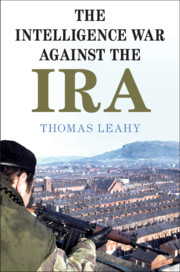Book contents
- The Intelligence War against the IRA
- The Intelligence War against the IRA
- Copyright page
- Dedication
- Contents
- Acknowledgements
- Abbreviations
- Introduction
- Part I The Intelligence War: August 1969 to July 1972
- 1 British Political, Military and Intelligence Strategy towards the IRA: August 1969 to July 1972
- 2 The Intelligence War: August 1969 to July 1972
- 3 The IRA’s Ceasefire: 26 June to 9 July 1972
- Part II On the Verge of Defeat? The Intelligence War: July 1972 to December 1975
- Part III The Struggle to Contain the IRA: January 1976 to April 1998
- Book part
- Notes
- Bibliography
- Index
3 - The IRA’s Ceasefire: 26 June to 9 July 1972
from Part I - The Intelligence War: August 1969 to July 1972
Published online by Cambridge University Press: 05 March 2020
- The Intelligence War against the IRA
- The Intelligence War against the IRA
- Copyright page
- Dedication
- Contents
- Acknowledgements
- Abbreviations
- Introduction
- Part I The Intelligence War: August 1969 to July 1972
- 1 British Political, Military and Intelligence Strategy towards the IRA: August 1969 to July 1972
- 2 The Intelligence War: August 1969 to July 1972
- 3 The IRA’s Ceasefire: 26 June to 9 July 1972
- Part II On the Verge of Defeat? The Intelligence War: July 1972 to December 1975
- Part III The Struggle to Contain the IRA: January 1976 to April 1998
- Book part
- Notes
- Bibliography
- Index
Summary
The IRA called a ceasefire from June to July 1972 primarily because it was keen to negotiate from a position of strength. Equally, various IRA leaders recognised the need for a negotiated political settlement. The IRA demonstrated their desire to engage in dialogue with the British government in early March 1972, when leading IRA members held secret talks with Leader of the Opposition Harold Wilson. This chapter also suggests that the British government were partly responsible for the collapse of the 1972 ceasefire. The British government never outlined the boundaries of a potential political settlement to the IRA. Neither did they try to politicise the republican movement by legalising Sinn Féin in Northern Ireland. The IRA contributed to the ceasefire’s failure too. Despite sizeable support levels in working-class nationalist areas, they had no political mandate from which to encourage the British government to provide concessions towards the republican position.
- Type
- Chapter
- Information
- The Intelligence War against the IRA , pp. 49 - 60Publisher: Cambridge University PressPrint publication year: 2020



